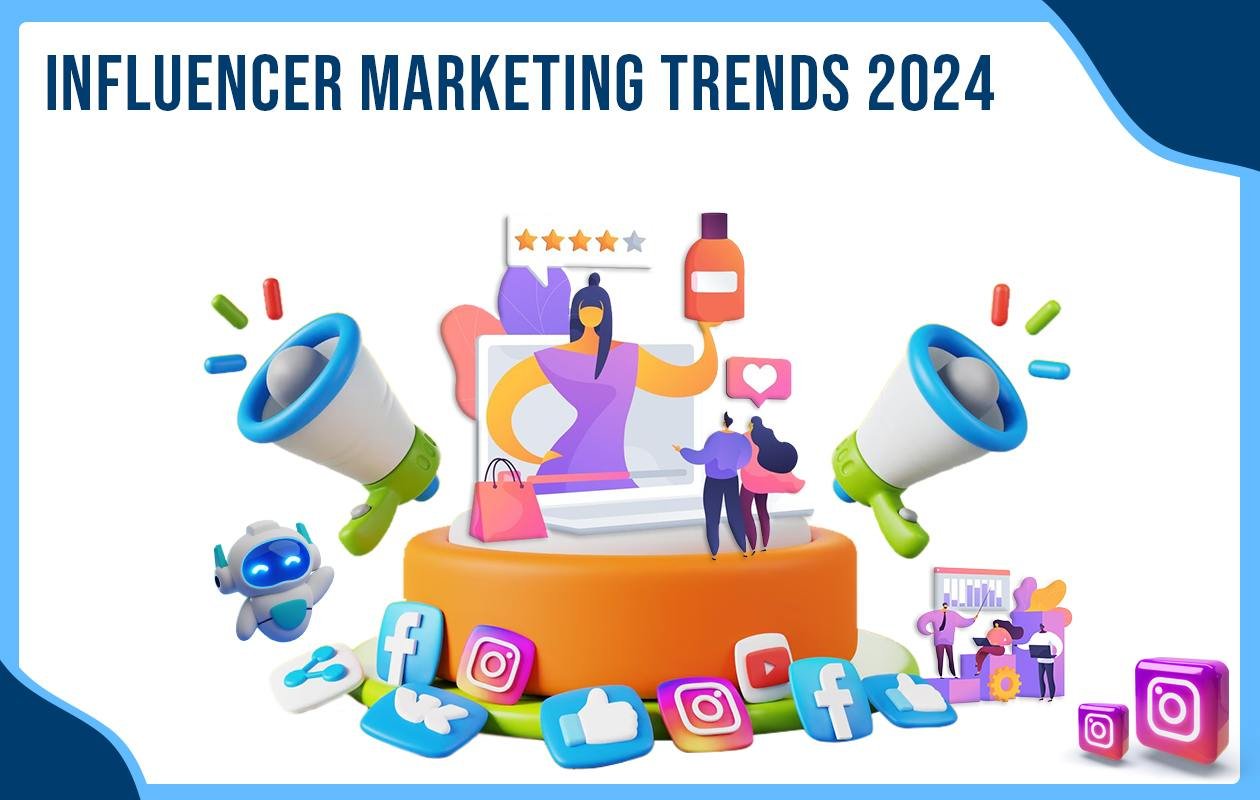Influencer Marketing Trends 2024
The field of influencer marketing is undergoing significant changes in 2024, with new technology, content styles, and shifts in consumer behaviors taking the spotlight. To stay ahead and make the most of your marketing efforts, it’s crucial to grasp these emerging influencer marketing trends 2024 and adjust your strategies accordingly.
This article delves into the key trends shaping influencer marketing in 2024, offering valuable insights into upcoming strategies and technologies that will redefine the landscape. This will help you effectively connect with your target audience, boost engagement, and achieve your marketing goals.
AI-Powered Influencer Marketing
Artificial intelligence (AI) is rapidly transforming influencer marketing’s future, providing brands with new tools and insights for enhanced campaigns and greater success. In 2024, AI is expected to play an even more significant role, driving innovation and performance in various ways.
For example, AI is set to have a substantial impact on content creation. Advanced algorithms can analyze vast amounts of data to understand audience preferences, trending topics, and the most engaging content formats. This allows influencers and brands to tailor their content strategies, ensuring it resonates with the target audience.
Other ways this influencer marketing trend will evolve include:
- AI-driven predictive analytics becoming more sophisticated, helping brands identify the most suitable influencers.
- AI streamlining campaign management by automating various aspects, from optimizing posting schedules to real-time performance metrics analysis.
- AI playing a crucial role in verifying the authenticity of influencers amid rising concerns about fake followers and engagement. Deep learning algorithms will distinguish between genuine and artificial engagement.
As technology advances, brands embracing these AI-driven innovations will gain a competitive edge in creating targeted, data-driven, and authentic influencer campaigns.
Cross-Platform Influencer Partnerships
In today’s interconnected world, consumers seamlessly consume content across multiple platforms, and influencers are not confined to a single channel. Brands in 2024 are increasingly turning to cross-platform influencer partnerships to reach a broader audience and deliver a more cohesive brand message.
Micro-Influencers and Hyper-Local Marketing
While macro-influencers with millions of followers still grab attention, brands recognize the value of partnering with micro-influencers. These influencers have smaller but more engaged audiences, fostering higher levels of trust and authenticity. This significantly impacts brand perception and purchasing decisions.
This trend is particularly relevant for hyper-local marketing, where brands aim to connect with consumers in specific geographic areas or niche communities. Micro-influencers, with their intimate knowledge of local trends and preferences, become invaluable partners in reaching and engaging these targeted audiences.
Live Shopping and Influencer-Driven Commerce
Influencer-driven e-commerce marketing, encompassing various forms of influencer-led product promotion and sales, is expected to continue growing in 2024. Brands are embracing the power of influencers to drive awareness and conversions.
For example, live shopping, where influencers showcase and sell products in real time, allows brands to engage with potential customers in an immersive and personalized way. This fosters a sense of connection and immediacy that traditional marketing channels often lack. Through live shopping events, influencers can demonstrate product features, answer audience questions, and address concerns in real time, leading to increased sales and brand awareness.
Authenticity and Transparency
Consumers increasingly demand genuine partnerships between brands and influencers, where brand values and influencer endorsements seamlessly align. Brands must carefully vet potential influencers to ensure they embody their values and can authentically advocate for their products or services.
Transparency is equally crucial in 2024. Brands should clearly disclose paid partnerships and influencer endorsements to maintain consumer trust and avoid potential backlash.
Long-Term Influencer Partnerships
While one-off influencer campaigns may yield short-term results, building long-term partnerships with influencers leads to deeper brand advocacy and more sustainable engagement in 2024. By cultivating relationships with influencers over time, brands can leverage their expertise, insights, and established audience connections to create consistent brand messaging, increase audience trust, and develop a loyal following. These long-term partnerships often lead to more creative and innovative campaigns, as influencers become brand ambassadors deeply invested in the brand’s success.
Performance-Based Deals
As brands strive to measure the return on investment (ROI) of their influencer marketing campaigns, performance-based deals are becoming more prevalent. These agreements tie influencer compensation to specific metrics, such as sales, website traffic, or engagement rates, ensuring that brands only pay for results. Performance-based deals align the interests of brands and influencers, incentivizing influencers to deliver high-quality content that drives measurable outcomes and maximizes brand ROI.
Short-Form Video Content
The rise of short-form video platforms like TikTok and Instagram Reels significantly shapes influencer marketing as a highly effective way of capturing attention and engaging audiences. Although this influencer marketing trend has been around for some time now, we can expect to see a notable rise in brands incorporating short-form videos into their campaigns in the next year. Short-form videos are particularly effective for storytelling, allowing brands to showcase products, highlight influencer personalities, and connect with audiences in a visually appealing and engaging manner.
User-Generated Content (UGC)
The final influencer marketing trend that we can expect to see in 2024 is the continued rise of user-generated content (UGC). This UGC will take various forms, including product reviews, social media posts, and user-created videos. By incorporating UGC into your influencer campaigns, you can leverage the power of genuine consumer experiences to build trust, increase engagement, and drive sales.
To Conclude
For businesses navigating these trends, partnering with a reputable influencer marketing agency is crucial. An influencer marketing agency provides the expertise needed to navigate these trends, ensuring a strategic and successful approach to influencer collaborations.

